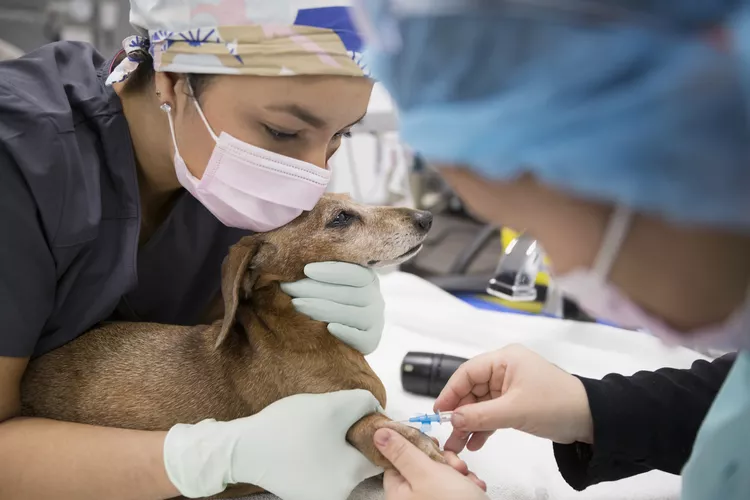
Cat head shaking is often a sign of a medical condition. Whether it's an underlying ear infection or a more serious problem, you'll want to get to the bottom of it quickly so your cat can get some relief. Here are some potential explanations for head shaking in cats and when you should contact your veterinarian.
Cats typically shake their heads when their ears are itchy or painful. The behavior may be frequent or intermittent, and the cat may also scratch their ears. Several medical conditions can cause itchy or painful ears.
Ear infections are the most common cause of head shaking in cats. Caused by an overgrowth of yeast or bacteria, ear infections can cause intense itching and pain. The ears may appear red and contain excess debris or discharge. Sometimes, the ears will have a foul odor.
Ear mites (Otodectes cynotis) are external parasites that are more often seen in cats than in dogs, but they're not especially common in indoor cats. The microscopic mites live and reproduce in the ears, causing intense itching that can make your cat shake their head for relief. It's common to see dark debris inside the ears that may have an unpleasant smell.
Allergies in cats can arise either from contact, inhalation, food, or insects (especially flea bites). These allergies often manifest as intense itching around the head, neck, and ears, and can include head shaking.
Cats can sometimes develop ear polyps, also called feline inflammatory polyps. These are benign growths that originate from the surface of a cat's middle ear, outer ear, or nasal cavity. The sensation of the polyp can cause cats to shake their heads and scratch their ears. Additional signs of a polyp vary depending on where it is located but can include:
Cats, being natural predators, are prone to getting insect bites, mostly on the face and paws. Some cats will have a reaction localized to the site of the bite that can include swelling, inflammation, itching, hives, and also head shaking. Although rare, your cat may experience an anaphylactic reaction, which requires immediate veterinary attention.
It's possible, though rare, for a cat to get foreign material in one or both ears. This is more likely to occur in outdoor cats while they're exploring. Things like seeds, dirt, and foliage can enter the ears and cause irritation or inflammation.
An aural (ear) hematoma, sometimes referred to as "pillow ear," isn't so much a reason for head shaking as it is something that can happen as a consequence of excessive head shaking. If a cat (or a dog) shakes their head hard enough, they can burst the small blood vessels within the ear flap (pinna). The ear flap fills with blood and takes on a puffy, pillow-like appearance.
Don't try to treat excessive head shaking in cats yourself. Over-the-counter ear medications can be ineffective and may even cause side effects such as deafness if the eardrum is damaged. Schedule an appointment with your regular veterinarian to get your cat's head shaking checked out.
There's a difference between head shaking and head tremors (or head bobbing). When a cat shakes their head, it's a deliberate behavior done as a response to itching or discomfort. Head tremors are involuntary and may resemble a subtle seizure. It can appear as if the cat is bobbing their head, or it may look more like trembling. Potential causes of head tremors in cats include:
If you think your cat is experiencing head tremors, see a veterinarian as soon as possible.
Contact your veterinarian if your cat is frequently shaking their head for more than a day or two. The vet will examine your cat and visualize the ear canals using an otoscope. This allows them to look for inflammation and debris and to determine if the eardrum (tympanic membrane) is intact. This step is important as some ear medications can be toxic to the inner ear. Next, they may take samples of ear debris or discharge to look at under a microscope, checking for yeast, bacteria, and ear mites.
If your cat's head shaking is mild and the ears are not red, you can try gently cleaning the ears with a cat-safe ear cleaner. Dampen gauze or cotton balls with the cleanser, then gently wipe away visible debris. Avoid putting liquid directly into the ear unless recommended by your vet. If the eardrum is damaged, liquids can make the problem worse.
Treatment for your cat will depend on the underlying cause of the head shaking and additional exam findings. In many cases, the veterinarian will recommend ear cleaning before using medications.
You may be able to prevent head shaking in cats by keeping their ears clean and bringing your cat to the vet for routine wellness exams. Be sure to contact your vet if your cat is shaking their head as they may be able to identify and treat the problem before it makes your cat very ill.

How to Take a Car Trip With Your Cat
Think you can't travel with your cat? Think again! Traveling with your cat just takes a little preparation and planning. Here's how.
How to Determine Your Cat's Age
Determining the age of an adopted cat is just guesswork, but a vet can look at teeth, sexual maturity, fur coat, and eyes to estimate.
Cat Food Ingredients to Avoid
When checking the nutrition content of cat food, look for ingredients that are not healthy or show it is of poor quality. Avoid these 3 ingredients.
What You Need to Know About Homemade Cat Food
If you want to cook for your cat, make sure to read about the risks associated with homemade diets for cats
Can Dogs Eat Raw Chicken Feet?
What are the potential health benefits of chicken feet for dogs? What are the risks?
Macadamia Nuts and other Nuts That Are Toxic to Dogs
Find out why macadamia and other nuts are poisonous to dogs, what signs to look for, and what is needed to treat the toxicity.
10 Tips for Taking Care of a Senior Dog
Is your dog a senior? Changes to their diet, exercise, and care are required. Here's how to make sure they're living their best and healthiest life.
Hookworms in Dogs
Hookworms can make a dog uncomfortable but may also lead to serious blood loss and anemia. Learn the causes, treatment, and prevention.
Is Swiffer WetJet Safe to Use Around My Pet?
ASPCA toxicologists deemed Swiffer WetJet to be safe for use around pets, but there are other all-natural floor cleaning options available.
Can Dogs Eat Bread?
Is bread a safe snack for you dog? Are there kinds of bread you should avoid? Learn more about whether it's okay to feed your dog bread.
14 Hypoallergenic Cat Breeds for People With Allergies
There are no true hypoallergenic cat breeds. But some, such as the Siamese and Siberian, might be less likely to cause allergies than others.
Burmilla: Cat Breed Profile, Characteristics & Care
The playful and social burmilla is one of the newest cat breeds to be officially recognized by the CFA. Learn about burmilla breed.
Nebelung: Cat Breed Profile, Characteristics & Care
The Nebelung is a rare breed of domestic cat that’s known for their long gray-blue fur and gorgeous green eyes. Learn about the Nebelung cat breed.
Cymric: Cat Breed Profile, Characteristics & Care
The Cymric, a long-haired Manx, is one of the world's oldest cat breeds. This tailless cat is friendly and playful. Learn about the Cymric breed.
Here's Why Cats Groom Themselves
Learn all about cats' grooming habits: how and why cats groom, including mutual grooming, over-grooming, and displacement grooming!
Pharaoh Hound: Dog Breed Characteristics & Care
Learn all about the Pharaoh hound, a sight hound dog breed known for their slim appearance and the ability to blush when excited.
How to Walk Your Dog
Dog walks should be fun for your dog while respecting your community. Learn why walking your dog is important and get essential safety and training tips.
How to Stop Your Dog From Whining
Whining is a natural way for your dog to communicate with you. Explore the reasons dogs whine and how to discourage your dog from whining too much.
How to Stop Your Dog From Barking Excessively
All dogs bark, but excessive barking is a behavior problem. Learn how to help stop excessive barking and prevent it from happening all the time.
How to Train Your Dog to Live With Another Dog
When you add a second dog to your household, it's natural that there will be an adjustment period. Learn how to get two dogs to become acquainted.